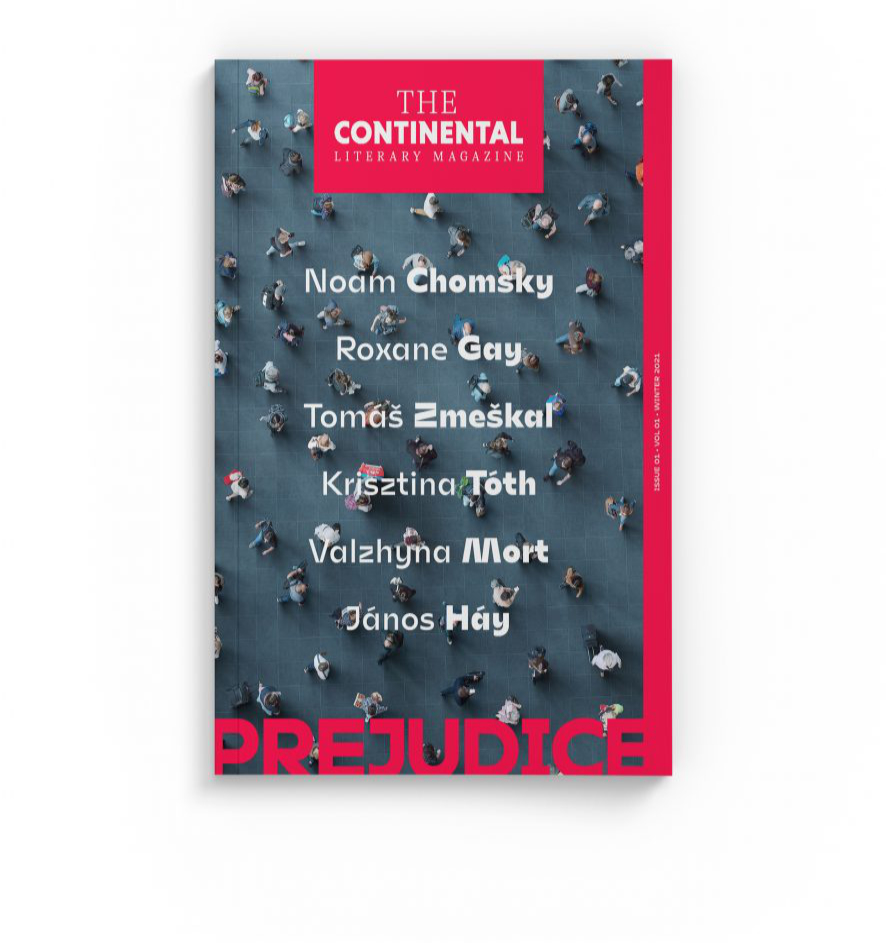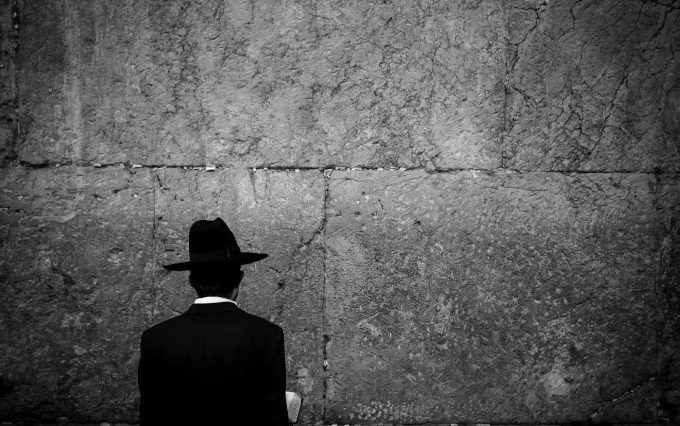
10th November 2021
Fiction
10 minutes read
Neither Sleep nor Slumber
translated by Marietta Morry & Walter Burgess

10th November 2021
10 minutes read
Szinai was having trouble with his vestments. His eyesight was poor, both for close-up and for distance. During the Friday evening Torah interpretation, he wore glasses for myopia so he could see the faces of the congregation from the pulpit[1]. He knew the prayer by heart, he kept the prayer book open in front of him only for the sake of custom and propriety, but now that he had to undo the difficult buttons of his velvet robe that reached the floor, he realized he could have used the reading glasses he had left at home. During the day he kept them in the inner pocket of his grey jacket while wearing the other pair either on his nose or pushed up on his forehead, but this time he had put on his Saturday black suit, so the glasses had stayed home. He accepted stoically most infirmities of old age: his failing eyesight, the sluggish bowels, the slightly embarrassing diaper he wore for incontinence, the medications he took by the handful—but he would not accept misplacing his glasses.
When he was not speaking in the synagogue or from the university lectern, or carrying out other duties as a rabbi, but instead had to deal with practical matters, he was inclined to give up and ask for help.
He considered it a blessing that he had a wife who was not only willing to take over tasks he could not do because of his ineptness, but she was also capable of doing them. Her efficiency was likely due to the fact that she was fifteen years younger than him. Four decades together had polished away their few rough edges. Ever since their two sons had settled down with their own families far away, in London and New York, visiting only in the summer, he and Judit had grown even closer, in spite of occasional frictions and nagging. If he did not complain to her every half hour, she would check on him to see if there was anything the matter. He, on his part, would call out anxiously every now and then to make sure she was there and feeling well, even though she was fit and athletic, swimming regularly and doing exercises every morning.
Despite being over 80, Szinai still taught at the Jewish university, performed weddings funerals, and visited the sick, as he had done for decades. He praised the Eternal God each morning upon waking, and then again after carrying out his duties, and then before going to bed, and once more the next morning for returning his soul to him yet again. When he was asked how he had managed to reach such an age in spite of his unhealthy life style, he attributed it to this routine of prayer. And to Judit, he always added. Anyone who knew him was aware that he tried to keep away from the endless squabbles within the community. He gained popularity because of his appearances on radio and TV and did not need any official role. But the truth was that when he was not teaching or delivering speeches, he was like a helpless child.
He pushed the glasses up his forehead, but somehow his trembling fingers could not manage the cloth covered buttons and narrow buttonholes. Flustered because of the struggle he called out to the shamas: Matyi, my friend, when you have finished with your work outside, please come in and help me.
When at last the shamas arrived to help, the rabbi asked what’s the matter, you are being very quiet today. The shamas only shook his head. Szinai sighed. It must be tough to go home to an empty apartment at times like this. I’ve been telling you all along. You mustn’t be discouraged. It’s still not too late to find someone. There are women of your age who also long for companionship. It is not good that a man should be alone, and it’s not me who says so. He pointed to the sky. Moses 1 2:18.
Marnó made a nervous gesture.
All right, I won’t push it, the rabbi became quiet. It was the shamas who broke the silence between them.
I am being evicted, he burst out in a complaining voice.
How come?
The administration is selling the apartment. They are going to put me in an old folks’ home in Újpest. I won’t be able to come here anymore.
Come on, Matyi, my friend, what makes you think that? He looked at the simple minded shamas, who had been serving alongside him for thirty years, now grown old, his back bent, but his baby face unchanged. It seemed as if he had never grown up.
You are needed here. I will talk to the leadership. You should just go home without worrying. I will have a breather, and he lowered himself into a chair with a groan. An old man is not a locomotive. I will lock up.
Key?
I am not senile yet. He patted the pocket of his jacket and then, to be sure, reached surreptitiously inside to check that the key was really there. Have a nice sabbath! I’ll see you in the morning.
Gut Shabbes, Mr. Chief Rabbi.
May God bless you, Matyi, my friend. If I’m alive, I will be here at eight o’clock; if not, I will meet you at the cemetery.
Marnó turned back to him. Please don’t say such things.
Can’t one even joke? Are we in such tzuris? the rabbi chortled. Well, off with you, I’ll last until tomorrow.
The door of the synagogue closed with a loud bang. He shuddered and looked around. With the exception of the color TV in the corner, the room had not changed at all during the thirty years he had been there. There was the Torah ark, two bookshelves with prayer books, khumshim[2], a wardrobe, and a long padded bench with its fake leather cover along the wall, which was old and worn out like himself. He looked at the oilcloth covered table, the plastic bottle, the glasses turned upside down on a dinted beige plastic tray, and he thought how Judit would never allow items like that in their home. He pushed his glasses up, massaged the bridge of his nose and then rubbed his eyes. Whenever he wore his distance glasses and then took them off, his eyes hurt.
He heard a noise. It sounded as if the door had been shut again. He thought that Marnó must have forgotten something. He put the glasses back on his nose, and suddenly noticed a stranger. This surprised and somewhat frightened him. No one came here at this time of day. Especially not in a uniform. A Russian officer in a service cap stood in front of him. Or Soviet as they say. He was a man with curly black hair, bushy eyebrows and rough features. He seemed to be between forty and fifty. He did not look Russian.
Sorry, but we are closed, Szinai said uncomfortably. The praying is finished.
Are you the rabbi? The officer said in Hungarian. He spoke with a heavy Russian accent.
I am.
Are you alone?
With the Creator, Szinai said. Though I walk through a valley of deepest darkness, I fear no harm, for You are with me. He raised his hand involuntarily. Are you familiar with it?
The officer turned around as if he were scanning the terrain. He seemed extremely tense. He did not look the rabbi in the eye, it was not clear where he was looking, or what he was searching for.
How can I help you? Szinai asked. He noticed only now that the man’s right hand in his jacket pocket, was pressed against his groin. Are you not feeling well?
The officer turned his back. He was staring at the entrance as if waiting for someone or afraid that someone might be coming. The rabbi caught the Russian’s nervousness.
I’m an old man. The words burst out of him. Would you give me a glass of water?
The complaining voice made the visitor turn around. The rabbi pointed at the bottle and the glasses in the middle of the table. As the officer moved closer, Szinai saw that his brow was covered in sweat. You should drink along with me, he said.
The man looked at him and then slowly reached for the bottle with a shaking hand. The water spilled onto the table cloth.
The rabbi pointed at the chair on the other side of the table. Sit down. Please.
The man took off his service cap. Szinai did not reprimand him for leaving his head uncovered in the synagogue.
He poured a glass for himself, too, and gulped it down. There was water trickling from the corner of his mouth. He wiped it and took a seat.
The rabbi tried to lean back on his chair to have the sharpest image of the other’s face through his glasses. What he saw did not reassure him. Every muscle and nerve in the face was moving, vibrating; a large vein throbbed at his temple.
Szinai’s throat constricted. He felt that he, too, was sweating, which was unusual for him. It seemed as if the other’s perspiration was covering his body as well.
Vos makht a yid[3]? He tried in Yiddish the way Jews have been asking each other for hundreds of years. But the man did not respond.
Suddenly, he did not know whether Yiddish was still spoken where the man came from.
Where exactly are you from? he asked.
Odessa.
And when did you come to Budapest?
Many year.
Szinai noticed that the officer’s right hand was still bulging in the jacket pocket. He tried to pretend not to notice it, as he tried to ignore the nervous twitching in the man’s feet and the shaking in his arms. Everything about him seemed oversized: his curly hair, his bushy eyebrows, his nose, his thick mouth, his whole head, his body. What could be bigger than a man this size? Perhaps several like him.
Have you been here before?
He shook his head. Szinai would certainly have remembered his face.
Drink some more if you are thirsty, and the rabbi leaned over to fill the glass.
The man pushed his glass over. The rabbi felt that his tension was lessening somewhat. The officer gulped down the water.
And what is your name, if I may ask?
Semyon. But my father had Hebrew name.
What was he called?
Yakov. Not live when I born. War.
My Hebrew name is Yitzhok Meir. If you wish, you can use your father’s Hebrew name. In his memory.
[1] In Budapest some Reform (called “Neolog” in Hungary) synagogues have a layout resembling a church; the rabbi speaks from a pulpit and wears something like a cassock.
[2] The five books of Moses.
[3] How is it going?







